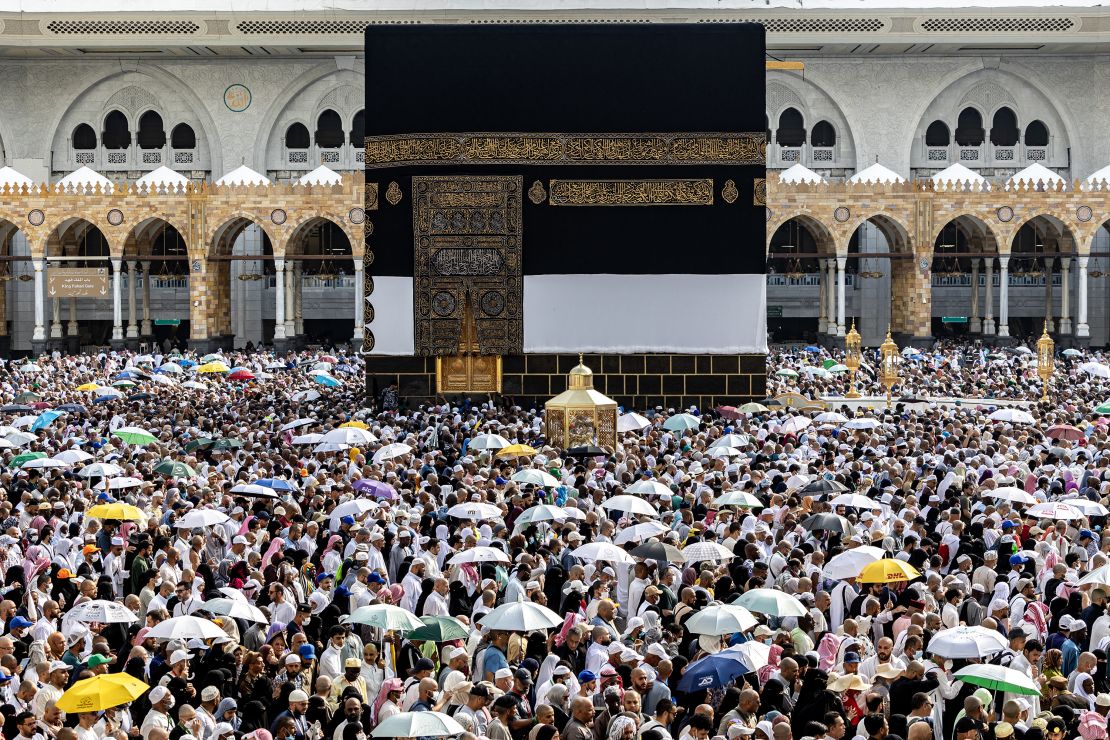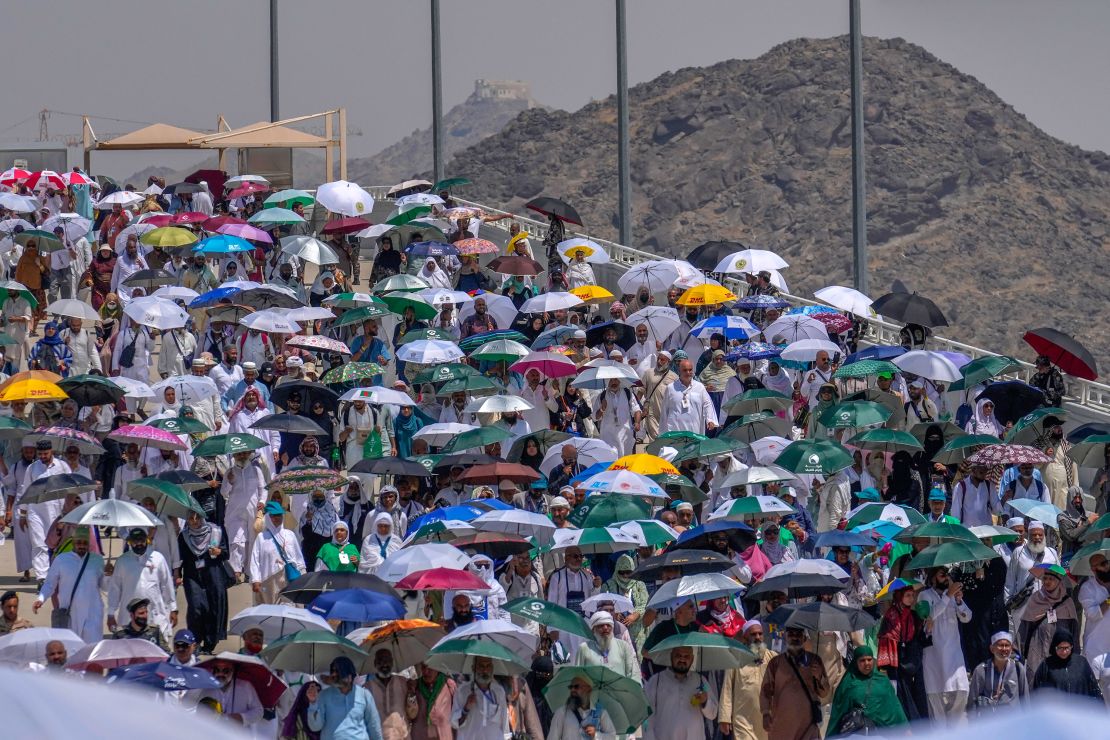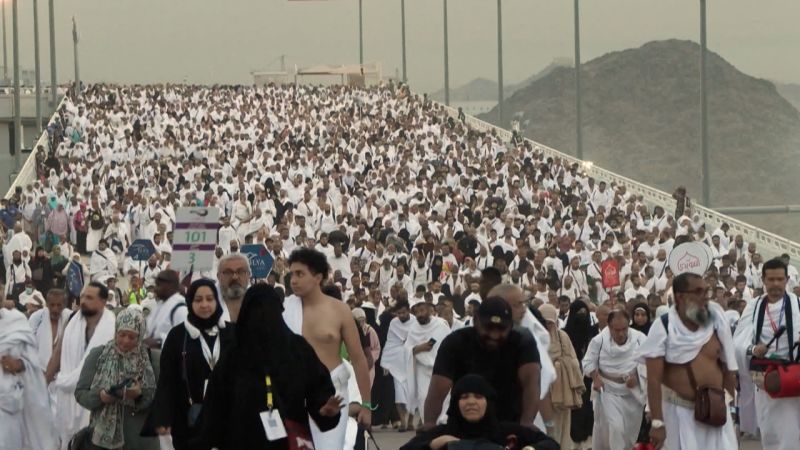Cairo
CNN
—
Abdelzaher Abdo Salem, 81, decided to make the pilgrimage to Mecca from Egypt after fulfilling a mission to get his youngest son Mahmoud married two years ago.
“This was his last wish,” his son Mahmoud said. “He couldn’t perform the Hajj before that because of the lack of money, and because I was going to get married, and there were a lot of expenses.”
Due to the high cost of Hajj through official channels – 150,000 Egyptian pounds ($3,091), in addition to plane tickets – Salem had resorted to a representative of an unlicensed company to organize the trip, at a lower cost of around 100,000 Egyptian pounds ($2,061).
But Salem never made it back to Egypt. He was among the more than 1,300 pilgrims who died during this year’s Hajj as temperatures in Saudi Arabia reached record levels.
Saudi authorities said that the vast majority of those who died were not authorized to conduct the rituals.
The tragedy, resulting in one of the highest Hajj death tolls in years, has brought attention to the shadowy industry of unauthorized pilgrimage agents. These agents profit from Muslims’ desire to fulfill their religious obligations by sidestepping official procedures, leading pilgrims on potentially hazardous journeys.
Saudi authorities said many of those who died “walked long distances under direct sunlight, without adequate shelter or comfort” as the temperature reached a record 125 degrees Fahrenheit (51.7 degrees Celsius).
For Salem, the process to get to Mecca involved obtaining a personal visit visa to Saudi Arabia instead of a special Hajj visa that would authorize him to access the holy cities and pilgrim facilities, including air-conditioned venues and medical services. A visit visa however bars entry into Mecca, so its holders are forced to take a desert path to access the holy city, often on foot.
Salem, who was traveling with his wife, had been promised by a representative of the Egyptian travel agency that a bus would be provided to transport the group. However, there was no transport for them to and from Mount Arafat, his son Mahmoud said, so the two had to walk towards Mina, around 8 miles away, to complete the “stoning the devil” ritual.
On the way, Salem’s wife became exhausted and sat down to rest. Determined to complete the rituals, her husband continued walking. He promised his wife he would return, said Mahmoud.
But contact with Salem was subsequently lost. His wife searched for him for five days until she found his name on the list of deceased at Al-Ma’aisam Hospital in Mecca.
“Our mother informed us of the news via a voice message on WhatsApp. The news was a tragedy for us,” Mahmoud said. “Our mother is there, devastated, and no one is there to comfort her.”
Each year, Saudi authorities issue licenses permitting legal access to Mecca for pilgrims. These licenses provide access to air-conditioned transportation and accommodation facilities for worshipers. However, the number of licenses is limited – 1.8 million this year – and they can cost several thousand dollars.
Every country is allocated a number of licenses that is proportional to its Muslim population. This process excludes those who cannot afford the license or are not included in the allocation.
Hajj is a once-in-a-lifetime religious obligation for every able-bodied Muslim. Many Muslims wait their entire lives to make the journey, often delaying the pilgrimage into their old age until they have saved enough money and fulfilled their family obligations. However, millions are left disappointed when they cannot secure a spot through official channels.
Each country traditionally gets one Hajj license for every 1,000 Muslims – that’s a 0.1% rate. But according to Egyptian officials cited in state media, Egypt, a Muslim-majority country of 110 million, was allocated 50,000 Hajj licenses this year, a rate of approximately 0.05%.
This has given rise to a lucrative industry of travel agencies that promise to get pilgrims to Saudi Arabia unofficially, often with assurances of transport and accommodation that may not be fulfilled or are below standard. Coupled with the extreme heat this year, this spelled tragedy for many pilgrims.

While deaths among pilgrims are not uncommon (there were more than 200 last year), this year’s gathering was held amid particularly high temperatures. Hajj season changes every year according to the Islamic calendar and this year it fell in June, one of the hottest months in the kingdom.
Atef Aglan, a member of the Egyptian Travel Agents Association, says there is a lack of awareness about the procedures of the Hajj among many Egyptians, which allows inexperienced tour operators and some mosque imams to exploit the poor, promising a cheaper Hajj without the appropriate visa or accommodation and transport.
He proposes criminalizing the phenomenon because “it has become a profession for those with no profession.”
“This is premeditated murder because this broker knows that the temperatures are above 50 degrees (Celsius), and he knows that these people do not have decent accommodation,” Aglan said.
A Hajj package from a licensed agency costs pilgrims approximately $4,760, while unauthorized trips cost around $3,700, Aglan says.
The average annual household income in Egypt is $1,429 as of 2019, according to the latest figures.
The tragedy has also underscored Saudi authorities’ inability to curb unauthorized pilgrimages or provide adequate care for those who undertake such journeys, which have been taking place for years.
It is unclear how many unauthorized pilgrims made it to this year’s Hajj, but Saudi news outlet Al Sharq Al Awsat reported Tuesday that 141,000 such pilgrims received free medical treatment during the Hajj season. That amounts to approximately 8% of the 1.8 million pilgrims this year.
In recent decades, the sheer size of Hajj crowds has been a factor in the number of deadly incidents during the pilgrimage, including a stampede that killed more than 700 people in 2015.
Recognizing the economic potential of religious tourism, Saudi Arabia plans to increase Hajj pilgrim numbers to 5 million by 2030 from just under 2 million now.
But some pilgrims have lamented the poor infrastructure and organization of the Hajj. Even those on official tours can spend the bulk of their day walking outdoors in searing heat.
Hania Hassan Salama, 65, a homemaker from Egypt, asked her children to draw a mural of the Kaaba on the wall of their house, a tradition in Egypt to announce a pilgrimage. The day the mural was completed, the children lost contact with her. The family was later informed that she had died, her relatives told CNN. Salama had purchased a Hajj package from a licensed tour operator.
Her nephew Mustafa Mohammed said responsibility for the large number of deaths partly lies with Saudi authorities.
“This year there was negligence, medical negligence. People were dying in the street and no one was helping them,” he told CNN. “Even if some people went on a visa not designated for Hajj, they do not deserve to be left to die in the street without finding medical help.”
Two other pilgrims who recently returned from Hajj told CNN there were insufficient medics or basic facilities to protect worshipers from the effects of the sweltering heat in Saudi Arabia last week. Even those pilgrims who made the journey through official channels said authorities failed to provide enough water, shade or medical support to worshipers.
Some witnesses have told CNN of how they saw worshipers losing consciousness and walked past bodies covered in white cloth.
A 44-year-old Indonesian man who only wished to be referred to as Ahmad, recalled seeing many dying from the heat.
“Along the way home, I saw many pilgrims who died. Almost every few hundred meters, there was a body lying and covered with an ihrom (white fabric) cloth.”
CNN has reached out to Saudi authorities regarding the reportedly inadequate response to this year’s heat and has yet to hear back.
Before this year’s Hajj season started, Saudi authorities warned pilgrims against using agents selling unauthorized Hajj packages and had been in contact with other governments in an effort to crack down on the trend. Authorities had also arrested some illegal agents and issued warnings about penalties for those found to assist unauthorized pilgrims.
Ahead of the pilgrimage this month, Director of Public Security and Head of the Hajj Security Committee, Lieutenant General Muhammad bin Abdullah Al-Bassami, laid out efforts to crack down on unauthorized pilgrims in a televised address, saying “the security of the pilgrims is a red line.” Regional papers subsequently said that more than 300,000 people had been barred from performing the rites as a result.

Since the tragedy, Egyptian authorities appear to be clamping down on unauthorized agencies. The government has ordered the revocation of the licenses of 16 Hajj tourism companies involved in making unauthorized pilgrimages to Mecca and has referred their managers to the public prosecutor.
Salem, the 81-year-old Egyptian who died during the Hajj, was buried in the Al-Baqi cemetery in Medina, Saudi Arabia according to an Islamic tradition that a pilgrim is buried in the holy land if he dies during the pilgrimage. His wife plans to return to Cairo Friday after completing the rituals.
Until she returns, Mahmoud said the family “is trying to contact her to calm and comfort her, and to urge her to take care of herself because she is there alone.”

